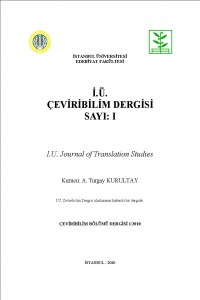THE NOTION OF ‘TRANSLATION AS REWRITING’ AND ITS IMPLICATIONS FOR THE POST-COLONIAL APPROACH TO TRANSLATION
Abstract
Bu makalenin amacı, André Lefevere tarafından gündeme getirilen
ve Maria Tymoczko tarafından geliştirilen „yeniden yazım‟ kavramını
çeviri bağlamında incelemektir. Ele alınan temel araştırma konusu,
Lefevere tarafından geliştirilen „yeniden yazım‟ kavramının,
Tymoczko‟nun kullandığı „yeniden yazım‟ kavramıyla ne ölçüde
örtüştüğünü inceleyerek, bu kavramın çeviriye yönelik sömürgecilik
sonrası yaklaşımın gelişmesinde oynadığı rolü sorgulamaktır. André
Lefevere çeviriyi bir „yeniden yazım‟ süreci olarak görür; bu süreç
sonucunda edebi metinlerin çevirmenlerinin, söz konusu metinlerin
kabul veya reddedilmelerinde, saygınlık kazanmalarında veya
kaybetmelerinde önemli bir rol oynadıklarını öne sürer. Lefevere‟ye
göre, güç, ideoloji ve yönlendirme gibi konular da hem ideolojik, hem
de yazınbilimsel unsurlarla örülü olan „yeniden yazım‟ süreciyle
ilintilidir. „Yeniden yazım‟ kavramını Lefevere‟den ödünç alan Maria
Tymoczko, çevrilecek metinlerin metonimik boyutları üzerinde
durarak, her yazımı bir „yeniden yazım‟, yaratılan her eseri bir
„yeniden yaratım‟ olarak tanımlar. Kavramı daha politik bir açıdan ele
alan Tymoczko daha geniş bir bakış açısı sunarak, bir bakıma, konuyu
Lefevere‟nin yaklaşımından bir adım daha öteye taşır. „Yeniden yazım‟
kavramının, „Batılı olmayan‟ kültürlerin „Batı‟daki imgelerini
oluşturmak ve „Batılı olmayan‟ kültürlerin metinlerinin yeniden
yazımındaki yönlendirmeleri sergilemek bakımından daha geniş
kapsamlı etkileri, sömürgecilik sonrası kültürlerin metinlerinin
çevirilerinde daha da belirgindir. Bu metinlerin çevirilerinde „güç‟,
„ideoloji‟ ve „patronaj‟ gibi konular özellikle ön plandadır.
References
- AHMAD, A (1992). In Theory Classes, Nations, Literatures,. Verso. London and New York.
- DINGWANEY, A. & Maier, C. (ed.) (1995) “Translating “Third World” Cultures” in: Between Languages and Cultures: Translation and Cross-Cultural Texts. University of Pittsburgh Press., pp. 3-14.
- INFANTE, Cabrera G., (1965/1985). Three Trapped Tigers (trans. Gardner D., Levine S.J., Infante G.C.), First Bard Printing, USA.
- LEFEVERE, A (1992a.). Translating Literature /Practice and Theory in A comparative Literature Context. The Modern Language Association of America. New York.
- LEFEVERE, A (1992b). Translation, Rewriting, and the Manipulation of Literary Fame. Routledge. London and New York.
- MUNDAY, J. (2001). Introducing Translation Studies Theories and Applications. London-New York: Routledge.
- ROBINSON, D (1997a). What is Translation? Centrifugal Theories, Critical Interventions. Kent State U.P., Ohio.
- ROBINSON, D (1997b). Translation and Empire. St. Jerome. Manchester, UK.
- SENGUPTA, M (1995). “Translation as Manipulation: The Power of Images and The Images of Power” in: Between Languages and Cultures: Translation and CrossCultural Texts (ed.) Dingwaney, A. & Maier, C.). University of Pittsburgh Press. pp. 159-173.
- TYMOCZKO, M (1999). “Post-Colonial Writing and Literary Translation” in: PostColonial Translation Theory and Practice (ed. Bassnett and Trivedi). Routledge. London and New York.
- TYMOCZKO, M (1999). “The Metonymics of Translation” in: Translation in a PostColonial Context. St. Jerome, Manchester.
THE NOTION OF ‘TRANSLATION AS REWRITING’ AND ITS IMPLICATIONS FOR THE POST-COLONIAL APPROACH TO TRANSLATION
Abstract
The aim of this paper is to analyse the notion of „rewriting‟ in translation as introduced by André Lefevere and further developed by Maria Tymoczko. The basic research question to be dealt with is to what extent Lefevere‟s notion of „rewriting‟ coincides with Tymoczko‟s conception of „rewriting‟ with a view to questioning the role this notion has played in developing the post-colonial approach to translation. André Lefevere views „translation‟ as a process of „rewriting‟, as a result of which the translators of literary texts have played a significant role in terms of the acceptance or rejection, canonization or non-canonization of those works. According to him, the issues of power, ideology and manipulation are also related to the process of „rewriting‟, which is embedded in ideological as well as poetological motivations. Maria Tymoczko, who borrows the term from Lefevere, defines every writing as a „rewriting‟, every creation as a „re-creation‟, focusing on the metonymic dimensions of the texts to be translated. Tackling the notion from a more political point of view, Tymoczko provides a much broader perspective; in a sense, she takes up from where Lefevere left off. The broader influences of „rewriting‟ in terms of constructing the images of the „non-Western‟ cultures in the West and displaying the manipulation involved in the process of rewriting the texts of the „non-Western‟ cultures are most visible in the translations of the texts of post-colonial cultures, in which the impact of „power‟, „ideology‟ and „patronage‟ is particularly relevant.
References
- AHMAD, A (1992). In Theory Classes, Nations, Literatures,. Verso. London and New York.
- DINGWANEY, A. & Maier, C. (ed.) (1995) “Translating “Third World” Cultures” in: Between Languages and Cultures: Translation and Cross-Cultural Texts. University of Pittsburgh Press., pp. 3-14.
- INFANTE, Cabrera G., (1965/1985). Three Trapped Tigers (trans. Gardner D., Levine S.J., Infante G.C.), First Bard Printing, USA.
- LEFEVERE, A (1992a.). Translating Literature /Practice and Theory in A comparative Literature Context. The Modern Language Association of America. New York.
- LEFEVERE, A (1992b). Translation, Rewriting, and the Manipulation of Literary Fame. Routledge. London and New York.
- MUNDAY, J. (2001). Introducing Translation Studies Theories and Applications. London-New York: Routledge.
- ROBINSON, D (1997a). What is Translation? Centrifugal Theories, Critical Interventions. Kent State U.P., Ohio.
- ROBINSON, D (1997b). Translation and Empire. St. Jerome. Manchester, UK.
- SENGUPTA, M (1995). “Translation as Manipulation: The Power of Images and The Images of Power” in: Between Languages and Cultures: Translation and CrossCultural Texts (ed.) Dingwaney, A. & Maier, C.). University of Pittsburgh Press. pp. 159-173.
- TYMOCZKO, M (1999). “Post-Colonial Writing and Literary Translation” in: PostColonial Translation Theory and Practice (ed. Bassnett and Trivedi). Routledge. London and New York.
- TYMOCZKO, M (1999). “The Metonymics of Translation” in: Translation in a PostColonial Context. St. Jerome, Manchester.
Details
| Primary Language | English |
|---|---|
| Journal Section | Research Article |
| Authors | |
| Publication Date | December 28, 2010 |
| Published in Issue | Year 2010 Volume: 1 Issue: 1 |

